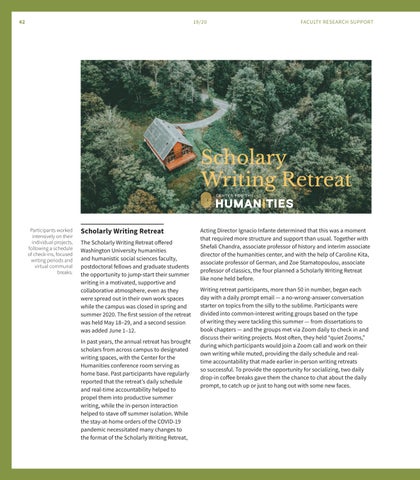42
19/20
FACULTY RESEARCH SUPPORT
Scholary Writing Retreat Participants worked intensively on their individual projects, following a schedule of check-ins, focused writing periods and virtual communal breaks.
Scholarly Writing Retreat The Scholarly Writing Retreat offered Washington University humanities and humanistic social sciences faculty, postdoctoral fellows and graduate students the opportunity to jump-start their summer writing in a motivated, supportive and collaborative atmosphere, even as they were spread out in their own work spaces while the campus was closed in spring and summer 2020. The first session of the retreat was held May 18–29, and a second session was added June 1–12. In past years, the annual retreat has brought scholars from across campus to designated writing spaces, with the Center for the Humanities conference room serving as home base. Past participants have regularly reported that the retreat’s daily schedule and real-time accountability helped to propel them into productive summer writing, while the in-person interaction helped to stave off summer isolation. While the stay-at-home orders of the COVID-19 pandemic necessitated many changes to the format of the Scholarly Writing Retreat,
Acting Director Ignacio Infante determined that this was a moment that required more structure and support than usual. Together with Shefali Chandra, associate professor of history and interim associate director of the humanities center, and with the help of Caroline Kita, associate professor of German, and Zoe Stamatopoulou, associate professor of classics, the four planned a Scholarly Writing Retreat like none held before. Writing retreat participants, more than 50 in number, began each day with a daily prompt email — a no-wrong-answer conversation starter on topics from the silly to the sublime. Participants were divided into common-interest writing groups based on the type of writing they were tackling this summer — from dissertations to book chapters — and the groups met via Zoom daily to check in and discuss their writing projects. Most often, they held “quiet Zooms,” during which participants would join a Zoom call and work on their own writing while muted, providing the daily schedule and realtime accountability that made earlier in-person writing retreats so successful. To provide the opportunity for socializing, two daily drop-in coffee breaks gave them the chance to chat about the daily prompt, to catch up or just to hang out with some new faces.

